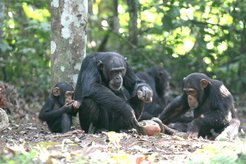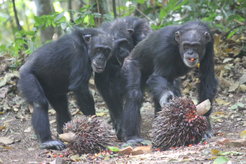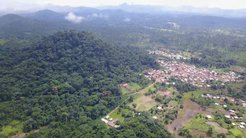Wild chimps struggle with tool use in old age
Scientists studying a rare population of tool-using chimpanzees have found that aging can have a profound impact on their abilities—but not all chimps decline equally.

To the point
- Tool use declines with age in wild chimpanzees according to 17 years of video observations
- Solid evidence that old age leads to gradual withdrawal from tool use, and contributes to lower efficiency in chimps' stone tool selection and use
- Chimpanzees mirror human beings in how aging impacts cognitive and motor skills. Much like in humans, the effects of old age varied considerably between individuals, with some chimpanzees struggling to use tools, whilst others maintained excellent performance into later life.
Wild chimpanzees use tools during some of the most cognitively and physically demanding foraging behaviors observed in non-human animals. While the behavioral changes that occur with aging have been widely studied in humans and some captive primates, exceptionally little is known about how growing older affects the lives of wild apes. This includes how the capacity to address technical, real-world tasks changes as wild chimpanzees become progressively older.
“Tool use is uncommon among animals, possibly because it requires a suite of physical and cognitive abilities, such as planning, fine motor coordination, understanding causal relationships, and identifying physical properties of objects in the environment. Given many of these faculties can be impacted by aging, wild animals’ tool-use behaviors could be vulnerable to decline with old age,” says Elliot Howard-Spink who led this work while at the Department of Biology, University of Oxford, and is now a postdoctoral researcher at the Max Planck Institute of Animal Behavior, Germany. “Until now, there has been no systematic study of how old age influences the technological behaviors of wild animals, likely due to a lack of long-term data.”
For aging chimps, the hammer slows too
To address this gap, the researchers used long-term data collected from almost two decades of study of chimpanzees in the Bossou forest, Guinea. Wild chimpanzees at the site are known for using stones as hammers and anvils to crack open oil palm nuts – a population tradition that requires selecting appropriate tools and executing a coordinated strike. So far, these are the only chimpanzees in Africa known to crack nuts using two movable stones.
The chimpanzees were systematically studied using an ‘outdoor laboratory’ in a clearing in the forest, where nuts and stone tools were made available for use by wild chimpanzees over many decades. The researchers monitored the behavior of five chimpanzees, four female and one male who, across a 17-year period, were estimated to age from between approximately 39–44 years old, to 56–61 years of age.

Elderly chimpanzees showed a significant decline in their attendance at the outdoor laboratory over successive field seasons, unlike younger adults, suggesting that elderly chimpanzees began to withdraw from nut cracking behaviors. For some elderly individuals, this decline in attendance was accompanied by a marked reduction in time spent interacting with nuts and stone tools when at the outdoor laboratory, further suggesting a broader pattern of age-related resignation from nut-cracking activity.
Elderly chimpanzees also showed changes in their efficiency when selecting tools (with some taking noticeably longer in later years), and when using tools to crack open nuts. Nut-cracking efficiency declined across several metrics, including increases in the time taken and the number of actions required to process each nut.
Interestingly, the authors noted stark differences in the magnitude of changes across individuals, with some chimpanzees showing pronounced reductions in efficiency, and others remaining relatively stable throughout old age. These results point towards significant individual differences in how old age influences wild chimpanzee behaviors, similarly to the variable patterns of behavioral aging observed in human populations.
“At Bossou, nut cracking is an important foraging skill observed in nearly all individuals who have been studied in the population,” says co-senior author Prof Dora Biro, Professor in the Department of Brain and Cognitive Sciences, University of Rochester, New York, US. “As ours was an observational study, we can’t yet identify the specific reasons why aging affects nut cracking, but our results raise important questions about how aging influences apes’ cognition and behavior in natural settings. Future work should explore whether skill proficiency in early life and adulthood, as well as later-life practice, influence the maintenance of such behaviors over an individual’s lifetime.”

This research was led by researchers at the University of Oxford (UK), and involved collaboration across international research institutions, including the UK (University of St. Andrews & Queen Mary University of London), Portugal (University of Algarve and CIBIO-BIOPOLIS), Germany (Max Planck Institute of Animal Behavior), Switzerland (University of Geneva), USA (University of Rochester), China (Northwest University, Xi'an), Japan (Chubu Gakuin University), and Mozambique (Gorongosa National Park).















